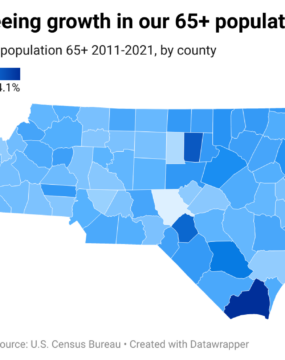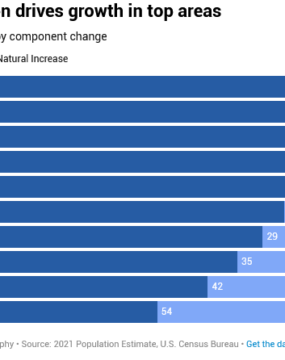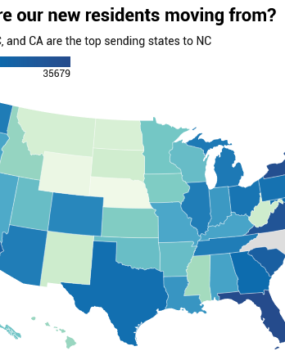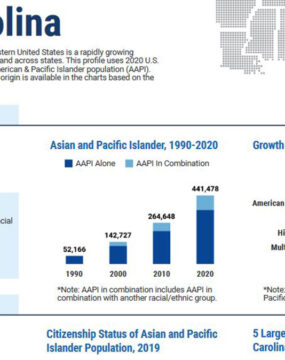Welcome to our blog
Keep up with our latest demographic insights

Dr. Michael Cline is the state demographer for North Carolina at the Office of State Budget and Management and has given us permission to re-post his content here. In 2012 our office began preparing population estimates and projections of North Carolina’s Hispanic population because the demographic had grown exponentially since 1990 to become a significant part of the overall North Carolina population. These data included annual estimates and projections for Hispanic and Non-Hispanic population groups…

Chronic absenteeism is a metric that’s closely monitored by school districts, because it can be a sign that students are out of school so much that it can affect their academic progress. In this post, we talk about how the pandemic has affected student attendance data. First, a definition: Chronic absenteeism is the percent of public K-12 students who missed ten percent or more of school days in a year. We calculate chronic absenteeism using…

Baby Boomers — those born between 1946 and 1964 — started turning 65 in 2011. Since that time, over 100,000 North Carolinians have turned 65 each year and this trend will continue well into the future. As Mike Cline noted in his look at NC’s population projects, the older adult population in North Carolina is expected to grow at double the rate of the overall population.. We can see this trend already taking place: In…

Nationally, there are 384 metropolitan statistical areas (MSAs), which are defined as economically integrated sets of counties with a core central city with a population of 50,000 or more. MSAs can be located within one state, or they can span across multiple states. They range in size from Carson City, Nevada (58,933) to the New York-Newark-Jersey City MSA (19,768,458) which crosses New York, New Jersey, and Pennsylvania. Within and including North Carolina, there are 17 unique metro regions, ranging from Goldsboro (116,835)…

From 2010 to 2020, North Carolina’s population grew by 9.8% with 49 of our 100 counties increasing in population. Among the largest gains: Charlotte and its suburbs, the Triangle region, and areas from Jacksonville (Onslow County) to Wilmington along the Atlantic Ocean. The map below shows a more detailed view of where we saw the biggest growth and losses amongst Census tracts. A Census tract is a unit of geographic measurement defined by the U.S.…

The majority of North Carolina’s growth over the past few decades has been from net migration, meaning more people moved here than moved away. We last looked at migration to North Carolina in June 2021, and wanted to see how things have changed over the past year. Where are our new residents moving from? Nearly 366,000 individuals moved to North Carolina in 2021, according to the U.S. Census Bureau’s American Community Survey (ACS). Most of those…

What’s behind the dramatic rise in the Southeast’s Asian Indian population? How can data points such as the median age of Asian American groups predict North Carolina’s future? How do the numbers match with growth trends of other populations like Latinx? A UNC Asian American Center collaborative study with Carolina Demography published in November 2022 will help researchers, scholars and communities answer those questions and many more as they plan for North Carolina’s future. The…

Nathan Dollar, PhD, has been named the new director of Carolina Demography, an applied demography center located within the Carolina Population Center at the University of North Carolina at Chapel Hill. Most recently Dollar served as a research scientist and project director for the Dynamics of Extreme Events, People, and Places (DEEPP) survey at the Carolina Population Center, where he investigated the factors that shape how people and communities in eastern North Carolina prepare for,…

Dr. Michael Cline is the state demographer for North Carolina at the Office of State Budget and Management and has given us permission to re-post his content here. Each year, he publishes population estimates and projections for North Carolina and its counties. You may have seen the recent news about the US Census Bureau redefining urban and rural areas. What do these definitions of rural and urban mean for North Carolina? So, what is an…

Dr. Michael Cline is the state demographer for North Carolina at the Office of State Budget and Management and has given us permission to re-post his content here. Each year, he publishes population estimates and projections for North Carolina and its counties. Our latest population projections show that North Carolina will reach 14.0 million people by 2050 – adding 3.5 million people from July 1, 2021 to July 1, 2050 (a 32.7% increase). Here are…
Your support is critical to our mission of measuring, understanding, and predicting population change and its impact. Donate to Carolina Demography today.